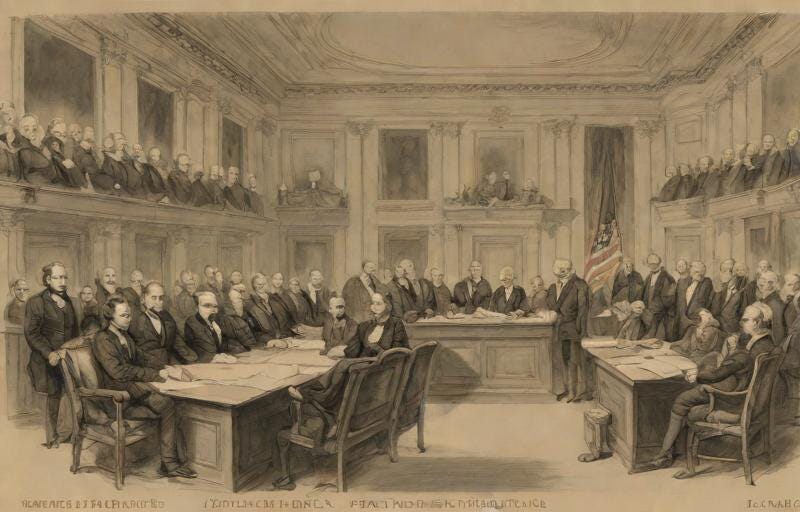This Day in Legal History: The Passing of the 13th Amendment
On January 31, 1865, a pivotal moment in American legal history unfolded as Congress passed the 13th Amendment to the Constitution, marking a significant turning point in the nation's journey towards equality and justice. This landmark amendment, which formally abolished slavery in the United States, came as a culmination of years of struggle and civil war, reflecting a profound shift in the national consciousness. Its passage symbolized not just the end of an inhumane practice, but also the beginning of a new era of legal and social reform.
The 13th Amendment's journey through Congress was fraught with political challenges, showcasing the deep divisions within the country at the time. It was an extension of President Abraham Lincoln's Emancipation Proclamation of 1863, which had declared slaves in Confederate states to be free. However, the Proclamation itself did not end slavery nationwide, which necessitated a constitutional amendment.
The Amendment's language was clear and unequivocal: "Neither slavery nor involuntary servitude, except as a punishment for crime whereof the party shall have been duly convicted, shall exist within the United States, or any place subject to their jurisdiction." This wording ensured that slavery was not merely suspended or mitigated but utterly dismantled in a legal sense.
The passage of the 13th Amendment was a complex legal achievement, requiring a two-thirds majority in both the House of Representatives and the Senate, followed by ratification by three-fourths of the states. Its adoption signified a legal recognition of the inalienable rights of a significant portion of the American population, who had been denied freedom and dignity for centuries.
Importantly, the 13th Amendment laid the groundwork for further advancements in civil rights. It was followed by the 14th and 15th Amendments, which granted citizenship and voting rights to former slaves, respectively. These Reconstruction Amendments collectively aimed to redefine the landscape of American civil liberties and the legal status of African Americans.
In retrospect, the passage of the 13th Amendment on January 31, 1865, stands as a testament to the enduring struggle for human rights and the ongoing evolution of legal principles in the United States. It reminds us that legal frameworks are not static but are capable of transformation, often in response to the demands of justice and equality.
In a landmark decision, Delaware Chancery Court Chief Judge Kathaleen St. J. McCormick ruled against Elon Musk's $55 billion compensation package from Tesla, which had been challenged by a Tesla investor as excessive and inadequately justified. This ruling, coming after about a year of deliberation, highlighted the extraordinary scale of the pay deal, noting it was 250 times larger than that of median CEO peers and over 33 times greater than Musk’s 2012 compensation, calling it "an unfathomable sum" and "historically unprecedented."
The judge criticized the process Tesla used to approve the package, pointing out conflicts of interest among board members. These members, including Tesla's former General Counsel and friends of Musk, were deemed "beholden" to him, leading to a lack of meaningful negotiation. This raised questions about the fairness and necessity of the compensation plan, especially given Musk's significant ownership stake in Tesla and his stated commitment to the company's success.
Furthermore, McCormick scrutinized Musk's motivations, highlighting his intention to use the compensation to fund his Mars colonization ambitions through SpaceX. Musk views this endeavor as a moral obligation and a means to protect humanity from potential threats posed by artificial intelligence. However, the judge questioned the necessity of such a large compensation package for retaining Musk and achieving Tesla's goals.
The judge's decision also delves into the concept of Musk's control over Tesla, referencing cultural touchstones like Star Trek and Shakespeare's Henry V to illustrate the extent of his influence. She concluded that Musk's control and the cooperative nature of the board rendered the process leading to his pay deal "deeply flawed."
In her closing remarks, Judge McCormick sympathized with Musk's legal team for their challenging task of defending the fairness of the largest potential compensation plan in public market history. Ultimately, she likened the flawed justification of Musk's pay package to a defective car design, requiring a "recall" and granting the investor's request for rescission.
Musk Judge Says ‘Unfathomable’ Deal Made Tesla CEO Overpaid (1)
Judge voids Elon Musk's 'unfathomable' $56 billion Tesla pay package | Reuters
A Republican-led panel has approved plans to impeach Homeland Security Secretary Alejandro Mayorkas, setting the stage for a historic House vote that could make Mayorkas the first Cabinet secretary impeached in nearly 150 years. The decision, advanced 18-15 along party lines by the Homeland Security Committee, is seen as the GOP's most significant political action against President Joe Biden's administration, especially with border security being a critical issue in the upcoming 2024 presidential election.
Republicans, led by Committee Chairman Mark Green, accuse Mayorkas of failing to enforce U.S. immigration laws and compromising public trust, particularly in handling the record-high migrant encounters at the U.S.-Mexico border. Despite this, the effort is expected to fail in the Senate, even with some Republican senators expressing concerns that targeting Mayorkas won't address border problems.
Democrats counter these accusations, arguing that the impeachment proceedings are a retaliatory measure and that Mayorkas' actions do not meet the constitutional standard for "high crimes and misdemeanors." The markup session witnessed heated exchanges and procedural objections, reflecting deep partisan divides.
Meanwhile, a group of Senate Republicans is working on a bipartisan deal to update immigration laws, contrasting with the House GOP's impeachment bid. This Senate effort, already criticized by leading House Republicans, proposes changes like narrowing asylum access and granting the president broader powers in immigration matters.
Mayorkas has defended his record, emphasizing efforts to enforce border policies while maintaining a "tough but humane" approach. His response was criticized by Green as lacking seriousness regarding his responsibilities. The move to impeach Mayorkas has gained momentum rapidly over the past month, with House Speaker Mike Johnson pledging a swift floor vote and GOP leaders actively whipping votes for it.
GOP Barrels Toward Impeaching Mayorkas as Democrats Cry Foul (1)
Republican US House panel advances impeachment charges against border chief | Reuters
At a U.S. Senate hearing, leaders of major social media platforms, including Meta Platforms Inc., X, Snap Inc., Discord Inc., and TikTok, faced intense scrutiny from lawmakers regarding child online safety. The Senate Judiciary Committee, chaired by Senator Dick Durbin, called these executives to Washington to address concerns over the spread of child sexual abuse material online and the impact of social media on young people's mental health. The hearing began with powerful testimonies from victims of online sexual exploitation on platforms like Facebook, Instagram, and Discord.
Senator Lindsey Graham criticized Meta CEO Mark Zuckerberg, accusing him of having "blood on his hands" due to a case of child sexual exploitation linked to his platforms. The hearing aimed to propel legislation targeting online child sexual exploitation, with lawmakers from both parties expressing frustration over the tech industry's slow response to growing accusations. These accusations include allowing underage users on their sites and ignoring the potential harms to teens' mental health.
Zuckerberg, facing Congress again, pledged Meta's cooperation in making platforms safer for teenagers, highlighting the company's efforts in deploying tools like parental controls and privacy setting reviews. However, he faced tough questions over his 2021 decision to reject expanding teams overseeing child safety. In contrast, CEOs Linda Yaccarino of X, Evan Spiegel of Snap, Jason Citron of Discord, and Shou Chew of TikTok, some of whom were testifying for the first time, planned to defend their companies' practices in detecting and removing harmful content.
The hearing underscored the urgent need for legislative action to safeguard children online, amidst ongoing debates over user privacy and the effectiveness of proposed measures. Lawmakers like Senators Marsha Blackburn and Richard Blumenthal championed a bill to legally require tech companies to protect children from harmful content, reflecting a bipartisan push for stricter regulation of social media platforms.
Meta, X, TikTok CEOs Face Senate on Protecting Kids Online (1)
















Legal News for Weds 1/31 - Musk Takes $55B Hit, GOP Moves to Impeach Mayorkas, and Senate Grills Tech CEOs on Child Safety